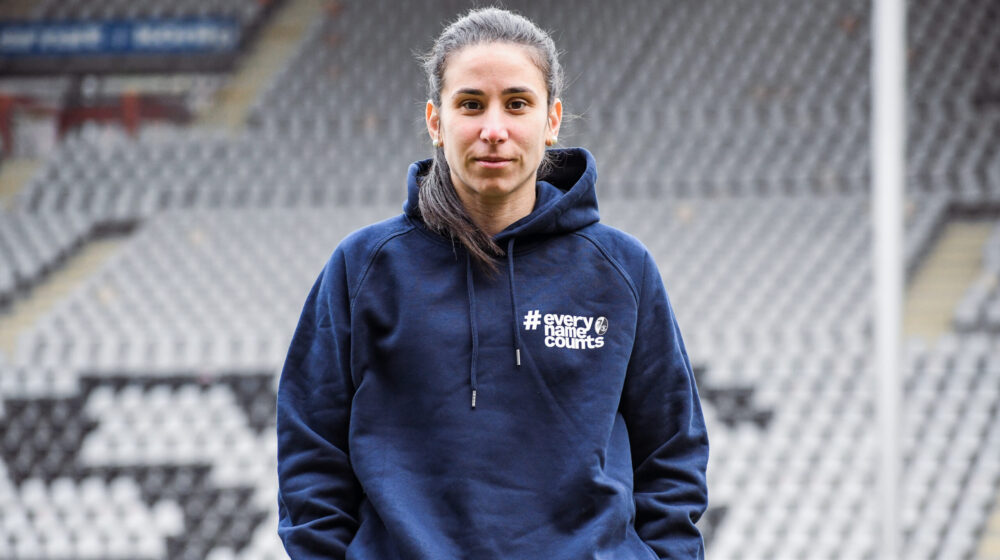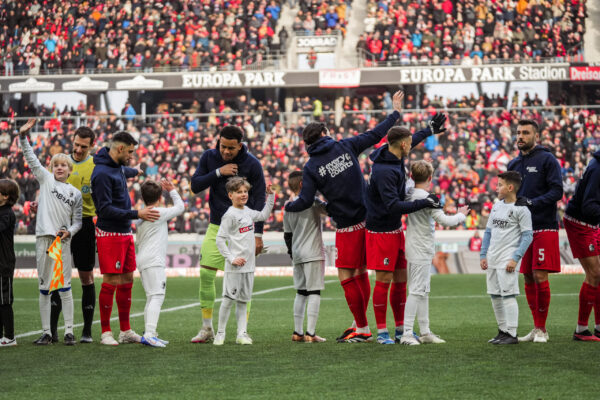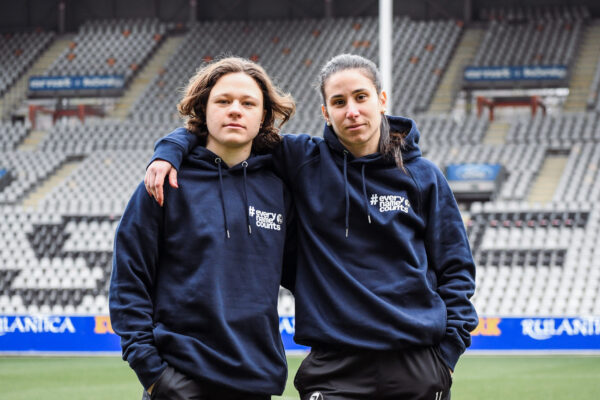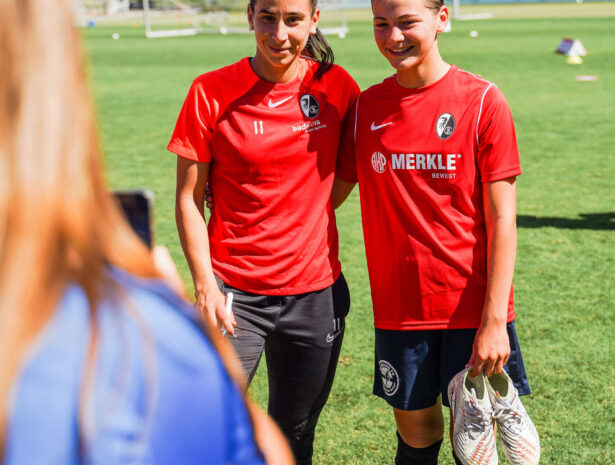“Football is for everyone” - Interview with Hasret Kayıkçı

As well as captaining SC Freiburg’s women’s football team, Hasret Kayıkçı has also played for Germany. Her club’s commitment to fighting racism, discrimination, and violence dates back many years. As our new #everynamecounts partner, SC Freiburg is taking a clear stand this year on the importance of remembering the victims of Nazi persecution. We asked Hasret what makes this issue so important. During the interview, she also spoke about her own experience of exclusion and racism.
Arolsen Archives: Hasret, what do you have to do to become captain of SC Freiburg?
Hasret Kayıkçı: As a child, I spent all my free time outside playing football. I only went home to eat and sleep. I played in the boys’ team at my home club in Heidelberg for as long as I could. When I was 16, I joined FCR Duisburg women’s team, and three years later, I moved to SC Freiburg. I became captain in 2021. Captains and the team council are elected by the team here at SC Freiburg, not just “appointed” as they are in some other clubs. I think that’s the right way of doing it, because it’s all about the interests of the team. If they vote for me, I know they’re behind me.
So you became captain after a proper democratic election. What does democracy mean to you as a citizen of this country?
I think democracy is really important for our country. But I’m worried about it at the moment. You can tell that tensions are running high here. Parties that don’t seem to me to be at all committed to democratic values are getting more and more votes. But I can’t imagine Germany without democracy because I grew up with it. That’s why I really hope that getting rid of democracy will never be up for debate here.
The whole club is supporting #everynamecounts. And by taking part in this initiative, you’re remembering a time when there was no democracy, a time when millions of people were persecuted, some of them athletes.
Remembrance is a way of making sure that nothing like that can ever happen again. When I visited a concentration camp memorial with my school, I was totally shocked. Seeing all the parts of the camp, all those buildings – it was completely different from just reading about them.
I’ve taken a close look at #everynamecounts already and found out how to digitize all the names and documents. I think it’s a brilliant project because it makes sure that these people won’t be forgotten. For many children and young people today, this chapter of history probably seems quite far away. That’s why it’s important to draw attention to the fact that this terrible persecution took place. And that it must never be allowed to happen again.
What kind of role can a football club play in all this?
The clubs need to get involved in issues like this because they have such a broad appeal. We can reach so many people. Especially young fans, who see us players as role models and look up to us. That’s why everyone needs to speak out and stand up for the right values.

Role models on the pitch: Hasret’s colleagues from the men’s team with some of their young fans last weekend. Photo: SC Freiburg
What values are particularly important to you?
Everyone deserves respect, that’s what my parents taught me. It doesn’t matter what you look like, what job you have, whether you’re rich or poor – everyone has equal value. One issue is especially close to my heart. I’m an ambassador for “Sport-Quartiere.” We players go to different places in the town where kids meet up to kick a ball around, and we train with the children. I think sport’s important for a carefree childhood. I want to show children that they can be whatever they want to be, regardless of their background. They should never let anyone tell them that they can’t do something.
What can football do to promote diversity in society today?
The way I see it, football stands for diversity – it’s for everyone. It brings people from different cultures together. As kids kicking a ball around together, we were all equal somehow. What counts is who you are, not where you come from. That’s exactly what our club stands for. For me, promoting diversity and respect is part of my job as captain, too. Everyone in the team needs to feel able to be themselves. Everyone should feel comfortable, and no one should be afraid of saying or doing the wrong thing.

Standing up for diversity and fighting discrimination: Hasret (right) with her teammate Ally Gudorf in the stadium in Freiburg. Photo: SC Freiburg
Are women’s teams faced with even more discrimination?
It’s certainly true that we have to think about lots of issues that have nothing to do with playing football. But at least people are talking about women’s football more now. It used to feel as if we had to solve all the problems on our own. Unfortunately, women experience discrimination on a regular basis in all sorts of contexts. But when it comes to football, many people think that because the men are earning millions, women players must be earning plenty too. In fact, only a few of us can afford to live on our salaries without doing something else on the side. At the same time, we invest loads of time in the sport, and we have to be extremely flexible to accommodate all the games and training sessions. We do it all for the love of football and for our fans. But you can’t really call it a professional sport yet.
Have you ever had any first-hand experience of discrimination or exclusion as a team?
Not yet, thank God. But I have a very clear plan in mind. If racist insults or discrimination were ever directed at our team or at the opposing team at any point, we would walk off the pitch immediately. Because these are values that we all stand behind, the whole team and the club. They’re not up for discussion.
Have you had any personal experience of racism, discrimination, or exclusion?
I’ve always had to deal with prejudice; it’s always been there. Just because of my background. I was born here, but my parents are from Turkey. If you don’t have a migration background yourself, you probably can’t really understand what it’s like. If not, you just can’t imagine it. When I go somewhere for the first time and I tell people my name, I often experience rejection.
In what form?
It’s just little things. I’ve been relatively lucky so far, I’ve never been the victim of a real racist attack. But when I was a kid, people would say things like “go back to your own country.” And day-to-day life is always a bit harder for you. When you apply for a job or look for somewhere to live, for example. Often I don’t even get invited to job interviews. Because I’m Turkish, not because of my qualifications. And no one admires me for being able to speak two languages as they would if I was a citizen of another country and had grown up here. There’s more prejudice against Turkish, somehow.
What are your hopes for the future, Hasret – not only on a personal level, but also with regard to the kind of social exclusion we’ve talked so much about today?
I hope all our players stay healthy, that’s the main thing. And I hope we play really well in the second half of the season. As far as racism and discrimination are concerned, it would be nice not to have to worry about things like that anymore. For example, one of the things I sometimes ask myself is this: if I ever have any children, will I feel able to give them a Turkish name? If my own experience is anything to go by, they would probably have far fewer opportunities than with a German name. On the other hand, it would really go against my personal values. It’s sad to have to think about things like that, I hope things will change in the future.


